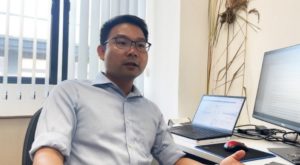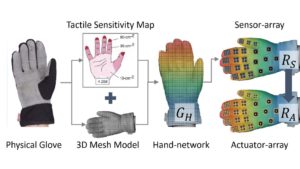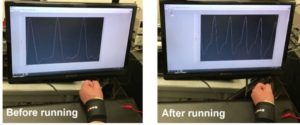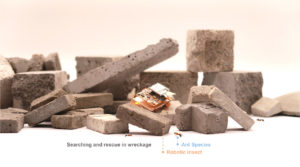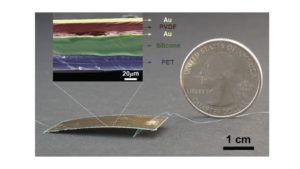Prof. Zhong Junwen joined the University of Macau (UM) in 2020, he is currently an Assistant Professor in the Department of Electromechanical Engineering of the Faculty of Science and Technology (FST) and one of the members of the Centre for Artificial Intelligence and Robotic. In 2016, he obtained a PhD degree in Electrical Science and Engineering from Huazhong University of Science and Technology, after that, he continued his research work at the University of California, Berkeley and the Japanese Institute of Physics and Chemistry. In recent years, he has published more than 50 academic papers in internationally renowned journals, with a total of more than 4,000 citations. At present, he mainly focuses on the research of flexible electromechanical systems, including the development and research of flexible robots, flexible sensors and actuators.
Using smart gloves to transmit the sense of touch
Today, coronavirus disease (COVID-19) has become one of the most dangerous challenges for the world. The COVID-19 social distancing policy has accelerated the popularity of the online communications, a “smart gloves” that developed by Prof. Zhong has flexible sensors and actuators that can transmit sensations and the sense of touch to others. It means that people can feel each other even in different places, they can feel the sense of handshake or even a hug. Prof. Zhong shared that the current technology for visual AR in sight and hearing is far more mature compared with the sense of touch. The “smart glove” can be a research for building up this technology. Prof. Zhong says, ‘The glove is flexible, thin and light, with motion perceptions and tactile feedback functions, which greatly enhances user’s sense of presence and makes the feeling more real and genuine.”
Sensors to detect underlying diseases
Another research is about flexible sensors and actuator arrays. Sensors can detect human pulse, so using algorithms can help to detect potential diseases. Prof. Zhong says, ‘In the case of two people are similar in age, height, and weight, their pulses should be relatively similar when two of them suffers from the same disease,’ ‘we use an experienced traditional Chinese medicine doctor as an example, the more experienced he has, the richer data and larger memory of the database, the easier it is to identify different cases.’
Using electronic cockroaches in search and rescue
A member of Prof. Zhong’s research team experienced the 2008 Sichuan earthquake, so the team is very interested in using flexible robots for detection. The electronic cockroach developed by Prof. Zhong is not only compact, but also very sensitive. It can also bear a weight of 1 million times heavier. It can quickly run to different places, doing tasks like search for life or detect gas leaks which are difficult for humans.
Sharing of personal experiences
From studying Chemistry in undergraduate degree to studying Electrical Science and Engineering in a Ph.D. degree, Prof. Zhong said because of his background in chemistry in the past, he was familiar with the research and development of chemical materials and devices which turned into an advantage for studying Electrical Science and Engineering. Therefore, he encouraged his students to better build up their basic knowledge first. Only with a solid foundation can help them reach their full potential. Prof. Zhong also shares, ‘In the field of electromechanical engineering, everything should be carefully examined before we act, then twice as much can be accomplished with half the effort.’ In regards of teaching in UM, Prof. Zhong said Macau is a bridge between the Mainland and the international, UM is a very special university. In addition to having academic freedom, the supports from the central government and the Macau government have given UM a lot of additional resources and advantages. He can also devote himself to research without distraction. In the future, he wishes to recruit more potential talents, establish a better research team, and work hard to create more flexible electromechanical systems.
鍾俊文教授於2020年加入澳大,目前擔任科技學院機電工程系的助理教授和澳大人工智能機器人研究中心成員之一。2016年他在華中科技大學獲取電氣科學與工程博士學位,畢業後在加州大學伯克利分校和日本理化學研究所開展研究工作。近年在國際知名雜誌發表學術論文50餘篇,所發表文章總引用超過4,000次。目前主要進行柔性機電系統的研究,其中包括柔性機器人、柔性傳感器及執行器的開發與研究。
利用智能手套傳遞觸覺,令感覺更真實
現時全球各地皆面臨新型冠狀病毒的挑戰,疫情下採取的社交距離政策,加速令線上社交成為主流。而鍾教授正在研究的 “智能手套” 具有柔性傳感器和執行器可幫助傳遞人體感覺、訊息和觸覺,令身處不同地方的兩個人也能感受到對方,可感受到握手甚至擁抱的感覺。鍾教授表示現時虛疑實景體驗往往更重視視覺與聽覺,觸覺的普及性及技術相對地沒有很成熟。這個“智能手套”剛好補充了這個缺口。鍾教授說:「它全是柔性,比較輕薄,具有運動感知與觸覺回饋功能,大大增強了用戶的臨場感,令感覺更真實更實在。」
傳感器探測潛在疾病
另一項研究則是有關柔性傳感器及執行器的陣列,傳感器可以探測人的脈搏,因此利用算法,可以幫助探測潛在疾病。假設兩人年齡、身高、體重都相近,當兩人都患有同樣疾病時,脈搏理應比較相似。鍾教授又以有經驗的中醫來比喻,指出經驗越豐富,就像數據庫內存就越大,越容易分析出病因。
利用電子蟑螂參與搜救及偵測
鍾教授的研究團隊中有一位成員曾經歷2008年的汶川大地震,因此團隊對於利用柔性機器人進行探測及搜救都十分感興趣。目前鍾教授研發的電子蟑螂體型不光小巧,動作更十分靈敏,還可以承受比自己重100萬倍的重量,可以快速地到人類較難達到的地方搜索生命或探測氣體洩漏等。
選擇澳大的原因
從本科選擇讀化學到博士選擇了電氣科學與工程,鍾教授表示正因為過去擁有化學的背景,對化學材料及器件研發都比較熟悉,對後來掌握物理電學形成了優勢。他勉勵學生們好好建立基礎知識,有穩扎的根基才能站得更高走得更遠。在機電工程的領域中,應先思考一遍才付諸行動,這樣才能事半功倍。對於選擇任教於澳大,鍾教授表示作為內地與國際的橋樑,澳大是一所十分特別的大學。除了擁有學術自由外,過去中央及澳門政府的支持令澳大獲得很多額外資源和優勢,他也可以心無旁騖地投入研究中。未來,鍾教授希望能招攬更多人才,建立更優秀的研究團隊,為創建更多柔性機電系統而努力前行。
鍾俊文教授 Prof. Zhong Junwen
智能手套傳遞人體觸覺 Smart Glove
運用傳感器測出跑步前後的脈搏
Sensors to detect underlying diseases
Using electronic cockroaches
in searching and rescuing
利用電子蟑螂參與搜救及偵測


